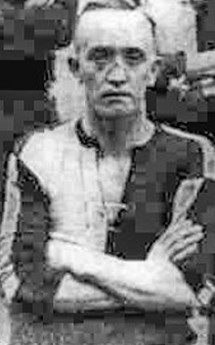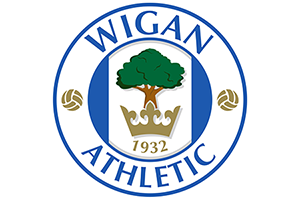Harry Wake - Player Profile

| Full Name: | Henry Williamson Wake |
| Born: | 21/01/1901 |
| Died: | 27/08/1981 (age 80) |
| Place of Birth: | Seaton Delaval, Northumberland |
| Nationality: | England |
| Height: | 5 ft 8 in |
| Position: | Defence |
| First Team Debut: | 27/08/1932 v Port Vale Reserves (H) - Cheshire County League |
| Signed: | 20/08/1932 (Free) |
| Left: | 31/05/1933 (Free) |
Henry “Harry” Williamson Wake (1901–1981) was an English professional footballer best known for his exploits with Cardiff City in the 1920s and later as a member of Wigan Athletic’s inaugural team in 1932. A versatile player who primarily featured at right-half (midfield) but could also play inside-forward, Wake’s career spanned the top tiers of English football and the grassroots level. He notably played in the 1925 FA Cup Final for Cardiff City and was part of the squad that won the FA Cup in 1927, although an injury kept him out of the final match. In 1932, as his career wound down, Wake joined the newly formed Wigan Athletic, making history by appearing in the club’s first-ever match.
Early Life and Early Career (1901–1923)
Harry Wake was born on 21 January 1901 in Seaton Delaval, Northumberland, an English coal mining community. True to his roots, he began his football journey playing for local colliery and village teams. As a teenager in the aftermath of World War I, Wake turned out for Bigges Main Colliery and Birtley Juniors, honing his skills in the competitive Northumberland coalfield leagues. His performances at the local level caught the eye of top-division scouts. In May 1919, at age 18, he signed professional forms with Newcastle United, one of England’s leading First Division clubs.
Wake’s time at Newcastle (1919–1923) was as a reserve player behind established stars. He made his First Division debut in April 1920 against Manchester City, but opportunities were scarce. Over four seasons at St. James’ Park, Wake appeared in only 3 league matches for Newcastle, failing to score. One early report of his debut noted the youngster’s promise, yet he faced stiff competition for a first-team spot. His second appearance came late in the 1919–20 season, and his third and final outing for Newcastle was in April 1922. With regular football elusive, Wake sought a move to revive his career. In May 1923, First Division Cardiff City purchased Wake’s contract for a transfer fee of £200 – a modest sum even at the time, but one that gave the 22-year-old a fresh start at a rising club.
Cardiff City Career (1923–1931)
Joining Cardiff City in 1923 placed Wake in a club then enjoying its golden era. Cardiff had just established themselves in England’s top division and were ambitiously chasing major honours. Wake made his Cardiff debut on 23 February 1924 in a 1–1 draw against Tottenham Hotspur. Initially eased into the side, by the end of the 1923–24 season he had earned a regular place in the lineup. Standing 5 ft 8 in tall, Wake played as a right-half, a key defensive midfield role. His tenacity and work rate soon made him a fixture in the team. By the 1924–25 campaign, Wake was an integral part of Cardiff’s first team. He appeared in 31 league matches that season and featured in all eight of Cardiff’s FA Cup ties during their remarkable cup run.
1925 FA Cup Final – Triumph and Tragedy
Wake’s solid performances helped Cardiff City reach the 1925 FA Cup Final – the club’s first ever Cup final appearance. At Wembley Stadium on 25 April 1925, Cardiff faced Sheffield United in front of nearly 92,000 spectators. Wake started the match at right-half, charged with disrupting Sheffield’s attacks. Unfortunately, the defining moment of the final came at Wake’s expense. After a tight first half-hour, a lapse in concentration by Wake led to the only goal of the game. According to contemporary reports, Sheffield’s winger Fred Tunstall dispossessed Wake on the edge of Cardiff’s penalty area and swiftly struck the ball past goalkeeper Tom Farquharson. Cardiff’s official history later described this as “a tragic error” – Wake hesitated instead of clearing a long pass, allowing Tunstall to steal in and score. The goal at 30 minutes put Sheffield United ahead 1–0, and Cardiff, despite their efforts, could not find an equalizer. The match ended 1–0, making Cardiff City the FA Cup runners-up of 1925.
The aftermath was harsh for Harry Wake. In the media, he was singled out as the unwitting villain of the final. The Daily Mail ran the headline “What was Wake thinking about?”, which it admitted was “the mildest remark applied to the poor half-back” in criticism. Welsh newspapers were even more scathing. The South Wales Echo published the punning headline “Wake Not Awake”, reflecting the sentiment that his momentary lapse had cost Cardiff the cup. Across Wales, similar headlines lambasted Wake, and it was said to have “taken him a long time to recover” from this public chastisement. In essence, Harry Wake became a scapegoat for the defeat, and the error would shadow his reputation for years.
Despite this setback, Wake remained a Cardiff City player and showed resilience in the face of criticism. In the seasons following the 1925 final, his role in the team fluctuated. The trauma of Wembley, combined with tactical changes, saw Wake in and out of the starting eleven. He was less of a regular starter over the next few seasons, as Cardiff shuffled their lineup. Notably, from December 1926, the coaching staff occasionally deployed Wake in an inside right (inside-forward) position rather than his usual half-back role. This experiment indicated his versatility – Wake could contribute in attack when needed – but also suggested he was competing with other established half-backs for playing time. Still, he remained an important squad member as Cardiff sought redemption for the 1925 disappointment.
1927 FA Cup Triumph and Personal Misfortune
Cardiff City rebounded spectacularly two years later, reaching the 1927 FA Cup Final – and this time winning the trophy. Wake had contributed significantly during the 1926–27 cup campaign. Reverting mostly to half-back, he played in several early rounds and even scored a goal in the semi-final, a 3–0 victory over Reading at Molineux that sent Cardiff back to Wembley. By now, Cardiff’s core included legendary figures like captain Fred Keenor and top scorer Hughie Ferguson, and Wake’s experience added depth to the side.
Fate, however, dealt Wake another cruel hand on the eve of the 1927 final. In April 1927, just one week before the Cup Final, Cardiff City played a league fixture against Sheffield Wednesday. During that match, Wake sustained a severe injury – damage to his kidneys – after a heavy collision. Ironically, before being stretchered off, Wake had managed to score a goal in that 3–2 win over Wednesday, showing he was in fine form. The injury was serious enough to hospitalize him and immediately put his Cup Final participation in doubt. Indeed, Wake was not fit to be selected for the 1927 FA Cup Final due to this injury. It was a bitter personal blow: Cardiff went on to face Arsenal at Wembley without Harry Wake in the lineup.
On 23 April 1927, Cardiff City famously defeated Arsenal 1–0 in the FA Cup Final, becoming the first (and still only) Welsh club to win the FA Cup. As his teammates celebrated the historic triumph – sealed by a bizarre goal from Hughie Ferguson – Harry Wake could only watch from the sidelines, recovering from his kidney injury. While he missed out on playing in the final, he was very much part of Cardiff’s cup-winning squad that season, having helped the team reach Wembley with his semi-final goal. (It is unclear if he received a winner’s medal, as in that era usually only the match-day players were awarded medals.) During the final’s euphoric aftermath, Wake’s mixed fortunes exemplified how cruel football can be: he experienced the highest success as a team member but was denied the chance to step on the field for the final itself.
Wake’s injury was severe enough that at the time, one London newspaper erroneously reported he had died as a result of it. The rumour of his death, fortunately, was greatly exaggerated. Wake recovered over the summer of 1927 and continued his playing career. In the 1927–28 season, Cardiff City now proudly bore the title of FA Cup holders, and Wake returned to action once fit. However, the club’s overall fortunes began to wane. Cardiff’s league form declined following the cup victory. In 1928–29, Cardiff suffered relegation from the First Division down to the Second Division. After relegation, the team underwent changes and Wake, now one of the older members, reverted to playing primarily at right-half, his original position, as the club tried to stabilize.
Harry Wake remained loyal to Cardiff City through these ups and downs. He stayed with the Bluebirds until mid-1931, spending a total of eight seasons at Ninian Park. By the time he left, Wake had amassed 166 appearances in all competitions for Cardiff City, scoring 10 goals for the club. Of those, 149 were league appearances in which he netted 9 goals. These statistics reflect a substantial contribution – he was a significant figure for Cardiff throughout the 1920s, even if two infamous moments (1925 and 1927) overshadowed his legacy there. After Cardiff’s relegation, the club was struggling financially and competitively, and in June 1931 Harry Wake finally departed Cardiff City as the team looked to rebuild. Despite the mixed memories, Wake’s time in Cardiff had made him a household name among Bluebirds supporters, known for both unfortunate and heroic reasons.
Later Career: Mansfield Town, Gateshead and Wigan Athletic (1931–1933)
At 30 years old, Wake sought to extend his playing days by stepping down to a lower division. In the summer of 1931, he signed with Mansfield Town, a club that had just been elected to the Football League. Mansfield were newcomers to league football, set to compete in the Third Division for the first time in 1931–32. Wake’s experience was valuable for the fledgling league side. He debuted for Mansfield Town in their first-ever Football League match on 29 August 1931. Fittingly, Mansfield opened their campaign with a victory: a home win over Swindon Town, with Wake playing at right-half. Throughout the 1931–32 season, Wake was a regular in Mansfield’s lineup initially. He made 20 league appearances for the Stags that season. Mansfield’s maiden league season proved challenging – they finished 20th in their division – and at the end of the year the club released some of its veteran players, including Wake.
In 1932, Wake had a brief stint with Gateshead (previously known as South Shields before relocation), another Third Division North side. He joined Gateshead in the first half of 1932, but this move did not reignite his career. Wake did not make any first-team appearances for Gateshead. It is possible he was signed as cover or trialist and never broke into the match squad. By mid-1932, at age 31, it seemed Wake’s professional career might quietly wind down. However, an unexpected opportunity arose that summer which gave him one final chapter in football – and a historic one at that.
Wigan Athletic’s Founding and Wake’s Final Season (1932–1933)
In the spring of 1932, the town of Wigan in Lancashire was preparing to launch a new football club following the collapse of the previous club, Wigan Borough. Wigan Athletic was founded in 1932, aiming to carry forward the torch of football in the town. The new club assembled a squad of seasoned professionals and promising players to compete in the Cheshire County League (since their application to join the Football League was unsuccessful). Wigan’s first manager was Charlie Spencer, a former England international, who also signed on as player-manager. Spencer recruited heavily from the North-East of England – many “Geordie” players – likely leveraging contacts at clubs like Newcastle and Gateshead. It was in this context that Harry Wake was signed by Wigan Athletic in August 1932 on a free transfer. Wake’s reputation as a tough, experienced half-back who had seen top-flight action (and perhaps Spencer’s knowledge of him from Newcastle circles) made him an attractive addition to the nascent Wigan team. He officially joined Wigan on 20 August 1932.
On 27 August 1932, Wigan Athletic played the first competitive match in the club’s history, and Harry Wake was part of the starting lineup. The match was a Cheshire League home game against Port Vale Reserves, held at Wigan’s Springfield Park ground. Wake lined up in the half-back line, wearing Wigan’s original colors – the team sported red-and-white halved shirts with black shorts (earning them the early nickname “The Reds”). A crowd of over 5,000 turned out to witness Wigan Athletic’s debut, an impressive attendance reflecting local enthusiasm. Although Wigan lost the match 0–2 to the strong Port Vale second string, it marked a proud moment for the club and for Wake personally – he had now been part of two clubs’ historic first games (Mansfield’s first League match and Wigan’s first ever match).
Harry Wake quickly became a mainstay of Wigan Athletic’s side during that inaugural 1932–33 season. As one account noted, Wake was “a great addition to the Wigan back line,” bringing stability and experience. He played as a first-choice half-back throughout the campaign. Out of 42 Cheshire League matches that season, Wake appeared in 39 league games for Wigan Athletic – a testament to his fitness and importance, given he was in his early 30s by then. He did not score any goals (his role was primarily defensive), but he helped marshal the defence and midfield. Wigan Athletic performed admirably for a brand-new club. They finished the 1932–33 Cheshire County League season in 5th place, with a record of 21 wins, 11 draws, 10 losses. The team also made a deep run in the Cheshire League Cup, reaching the semi-finals that year. Wake’s veteran presence was credited as one factor in the club’s solid start. A local season recap highlighted that Wigan had been “blessed with two prolific goalscorers up front (Bill Botton/Chambers and Barney McCabe) and a sturdy defence featuring Charlie Spencer and Harry Wake at its core.
Despite his contributions, Wake’s tenure at Wigan would last just that single season. The club had ambitious plans and, under player-manager Charlie Spencer, undertook a major overhaul after their first year. In the summer of 1933, Wigan Athletic retained only two players from the original squad – Spencer himself and full-back George O’Dell. All others, including leading scorer Bill Chambers (who had scored over 40 goals) and stalwart half-back Harry Wake, were released as free agents. Wake left Wigan Athletic in May 1933 when his one-year contract expired. At 32, after 39 appearances for Wigan, he effectively retired from senior football. His appearance in Wigan’s final game of the 1932–33 season appears to have been the last act of his playing career.
Retirement and Legacy
Harry Wake’s professional football career concluded in 1933 after his season with Wigan Athletic. Having spent over a decade in the game, from the top-flight heights with Newcastle and Cardiff to the regional leagues with Wigan, Wake retired with a wealth of experience and a unique story. In the span of two years, he had the rare distinction of playing in two clubs’ first-ever matches – Mansfield Town’s inaugural Football League fixture in 1931 and Wigan Athletic’s inaugural match in 1932. This quirky achievement speaks to how Wake was often in the right place at historically significant moments.
After hanging up his boots, Wake stepped away from the spotlight. Little is documented about his post-football life. Given his Northumberland roots and Cardiff connections, it is unclear whether he settled back in the North-East of England or remained in South Wales. By the time the Second World War broke out, Wake was in his late 30s, likely working in civilian life. He largely lived out his later years in relative anonymity compared to his dramatic footballing days.
What is certain is that Harry Wake remained part of football folklore in the clubs he touched. In Cardiff, older generations would recall the infamous “Wake Not Awake” final – a cautionary tale of how one mistake can become headline news. With the passage of time, however, Cardiff City’s 1927 FA Cup win became a celebrated legend, and Wake’s role in getting the team there (scoring in the semi-final) is often acknowledged by historians. Meanwhile, at Wigan Athletic, Wake is remembered as one of the club’s pioneer players. The Wigan Athletic Heritage Society lists him as Heritage Player #11, commemorating his place in the first squad in 1932. Wigan fans looking back at the “Arsenal of the Cheshire League” team (so nicknamed for their cherry-and-white kit and quality of play) will find Harry Wake’s name among those first heroes who laid the foundations of the club.
Harry Wake died in 1981 at around 80 years of age. (One source gives the date as August 27, 1981, which coincidentally would have been the 49th anniversary of Wigan Athletic’s first match.) His passing went largely unnoticed in national media, but he left behind a legacy threaded through English football history. Wake’s life story—from the coalfields of Northumberland to the heights of FA Cup finals, and then to helping new clubs find their feet—illustrates the journeyman football experience of the early 20th century. He experienced both the adulation of fans and the harsh glare of press criticism; he tasted both heartbreak and triumph.
Harry Wake’s journey through football is a testament to perseverance and passion during an era when the sport was rapidly evolving. He may not have been the biggest star of his time, but he was involved in some of English football’s most storied moments: from the “Welsh Wizards” of Cardiff in the 1920s to the birth of a new club in Wigan. Today, historians and dedicated fans keep his memory alive through club archives and stories passed down. Wake’s life encapsulates the highs and lows of the beautiful game – making him a player worth remembering in the rich tapestry of football history.
Wigan Athletic Career
| League | FA Cup | League Cup | Other | Total | |||||||
|---|---|---|---|---|---|---|---|---|---|---|---|
| Season | Apps | Goals | Apps | Goals | Apps | Goals | Apps | Goals | Apps | Goals | |
| 1932-1933 | 39 (0) | 2 | 0 (0) | 0 | 0 (0) | 0 | 5 (0) | 0 | 44 (0) | 2 | |
| TOTALS | 39 (0) | 2 | 0 (0) | 0 | 0 (0) | 0 | 5 (0) | 0 | 44 (0) | 2 | |


